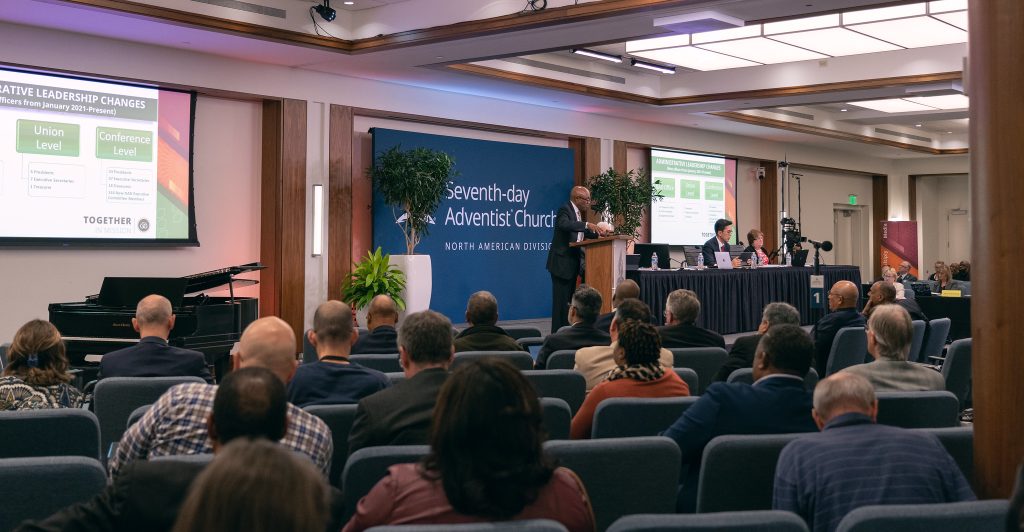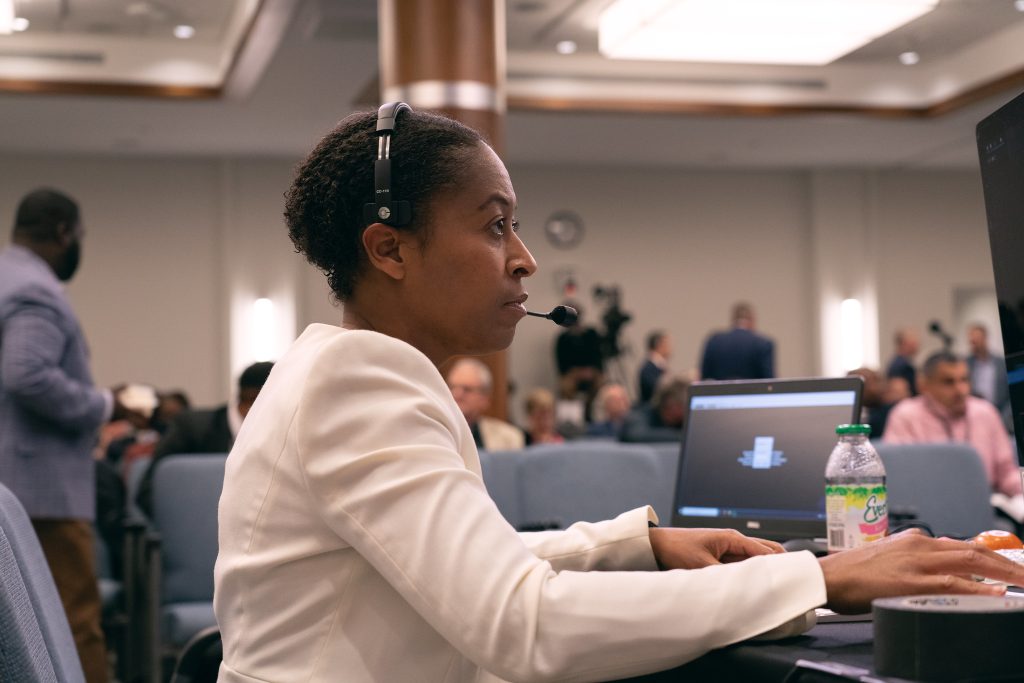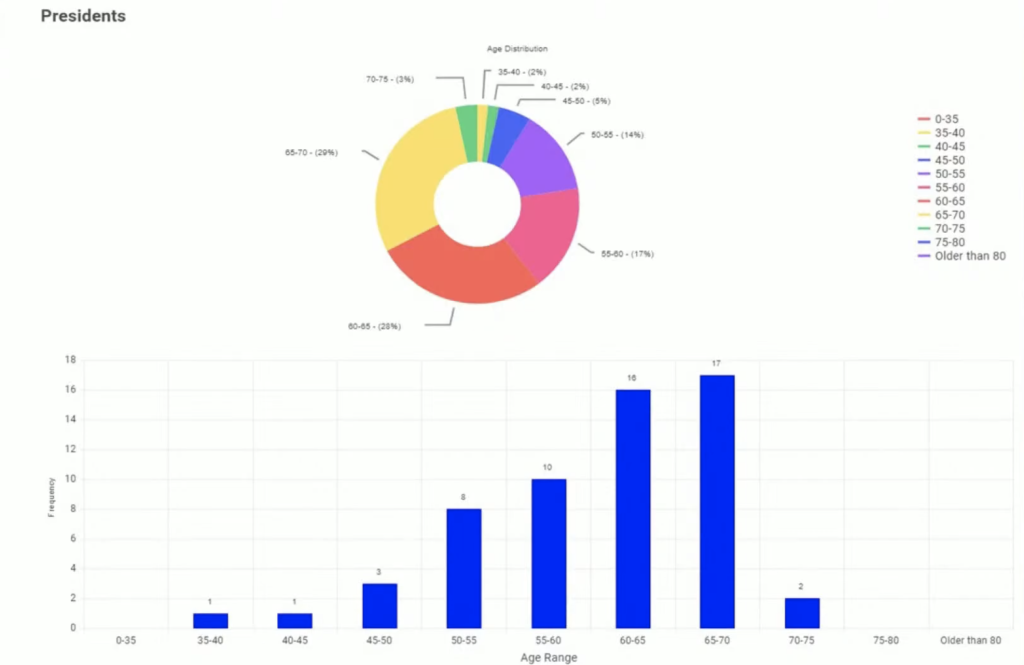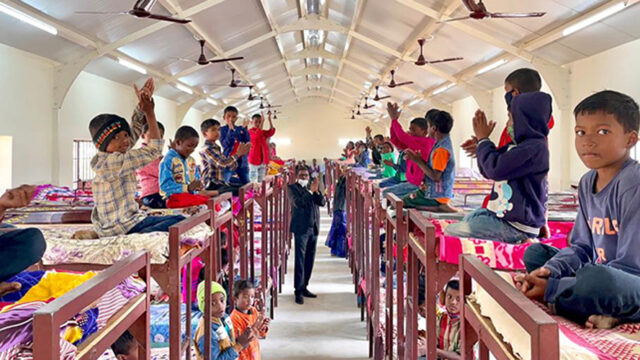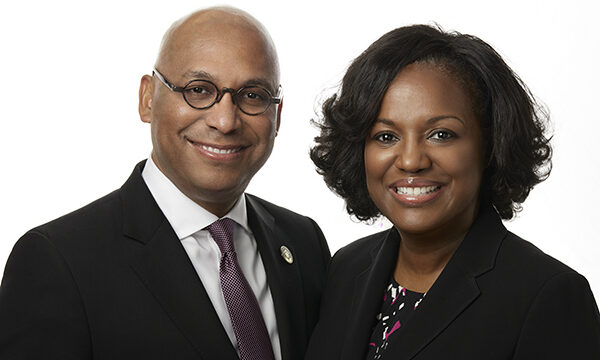NAD President’s Report highlights relevance of Adventist mission and message.
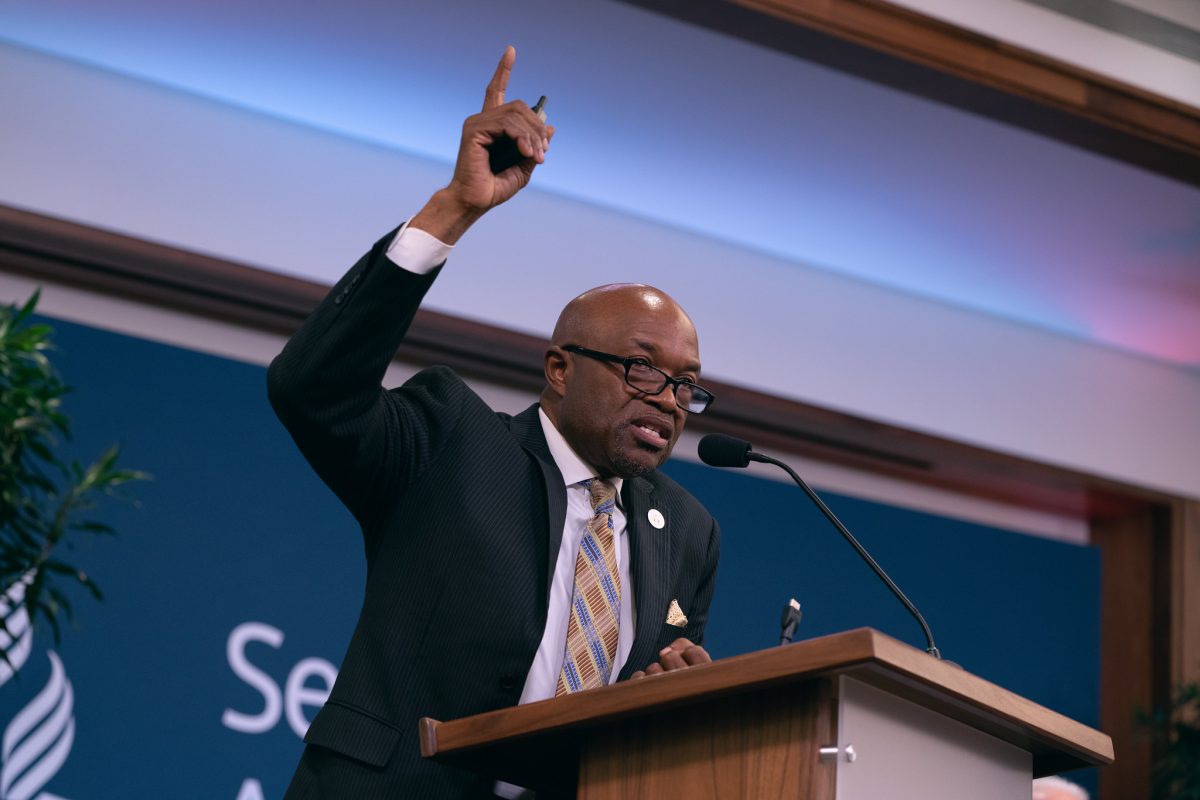
At the North American Division (NAD) headquarters in Columbia, Maryland, United States, the 2022 NAD Year-End Meeting started at 3 p.m. on Thursday, October 27. This annual business meeting, which has returned to an in-person event, with livestreaming on the NAD website, Facebook, and YouTube, provided the opportunity for 300 executive committee members to receive reports, amend policies, strategize, and fellowship with church leaders who have dedicated themselves to sharing Christ and the Adventist faith with others.
“During the pandemic, the ministry of the church went forward, and we especially thank the Lord for our teachers, health care workers, and IT personnel for their work. And our unions and conference leaderships, our pastors, and the faithful members for what you have done — a heartfelt thank you for your service,” NAD president G. Alexander Bryant said, as he opened his report after thanking the division staff. Bryant’s long list of appreciation included church members, pastors, educators, health care workers, communication and information technology experts, and the leaders of conferences, unions, and the division for their dedication and service.
“As we have examined our life, we have had to do ministry and the mission of the church through incredible political strife, economic collapse, and natural disasters, and yet we have seen God’s church move forward. God has been blessing His church during the pandemic,” Bryant said. He listed many of the events the division has held in the past year, including the CALLED Pastors’ Family Convention, Pathfinder Bible Experience, Sabbath School virtual conference, Sonscreen Film Festival, Adventist Community Services convention, and much more. Bryant also briefly addressed innovative breakthroughs just on the horizon for AdventistGiving, Adventist Information Ministry, and Adventist Education’s student information system.
The Different Faces of Evangelism
Early in his report, Bryant explored the notion that evangelism has many different faces and approaches. He recognized the efforts of Health Ministries, Youth and Young Adult Ministries, and other ministry departments that have collaborated to address mental health and wellness. He also shared that “evangelism has been going on all across the division” through schools, food pantries, and digital outreach — among other efforts.
Bryant declared that all of Christ’s followers are called to serve. He said that not only is the church built for this time, but the changes in the church’s leadership as many begin to retire or make plans to retire are also by God’s design.
“God has called each of us at this moment in time. Only God knew what was going to take place in 2022 when He called you to be a leader today,” Bryant told delegates. “God knew what He was doing. And I asked the question: What would happen if we did more of these things, if we collaborated more, if we networked our resources more, if we worked together in mission, aligned with the ‘I Will Go’ global church initiative? Is God trying to push us in a certain direction? Is God trying to move us into a place where we can only make it with His miraculous intervention?
“Maybe God is using these events to position His church so that we would seek Him and receive what God has waiting for us, and that we will prioritize mission unlike we ever have before,” he said.
Reaching Into the Cities
As part of his report, Bryant shared a look at the North American megalopolises, in particular 20 metropolitan areas. In these places, he said, you have epicenters of power, and even though “we’re only five percent of the world population, those megalopolises control 20 percent of the United States GDP, the largest economic output of any megalopolis in the world. … And what this spoke to me about was the power of cities. The political power, the entertainment power, the economic power, the media power, the educational power, … and God has called us to impact these cities.”
Bryant then introduced the Antioch Initiative, when “we take the resource that we have collectively, and we focus them in one area — we’re talking about centers of influence. We need to have thousands of centers of influence all around the North American Division.
“‘Together in Mission’ is the theme we have adopted,” Bryant continued. “Together in Mission: I Will Go,’ and what that means is that we’re stronger together. We can come together and power the church forward in a better, stronger, and more effective way than if we did it separately. One of our strategic focuses for the next three years is to take our media resources and expand them, and to focus on how we can take these media resources to be more impactful in these big cities that God has called us to reach.”
Of the three strategic focuses the division designated in 2021* as important, the use of media will be vital in reaching the cities. Bryant encouraged year-end meeting attendees to explore the opportunities and network, and collaborate across all organizations, finding ways in which “we can maximize and expand our utilization of media.”
“This is an area where we can allow our youth and young adults to help lead the way,” Bryant said. “Why not let them loose in the areas that they naturally live in to lead the church on how we can use those social media platforms to advance the gospel of Jesus? That is what that initiative is about, to train and equipment 10,000 digital missionaries. We’re going to train and equip them to go into the ‘new’ arena we call social media, and spread the love of Jesus Christ.”
Fight for Mission
The NAD church membership at the end of 2021 was 1.271 million, said Bryant, and if you consider that 50 percent of the population of the U.S. is in those 20 metropolitan areas and look at the church member ratio in North America to the general population, there is one Seventh-day Adventist for every 370 people. The church needs to grow exponentially, Bryant said. “Together we can make a stronger impact in these cities.”
Bryant addressed the issue of church leaders being the example, calling efforts a “fight for mission.” He said, “‘Multiply’ is to leverage the opportunity to exponentially grow the ministry of Jesus and all the aspects of ministry such as praying, building relationships, educating, helping, healing, proclaiming, revitalizing, and church planting.”
Bryant shared that the NAD administrators and union presidents have agreed to leading the way in evangelism. He expressed that many NAD ministry leaders have been doing their part to be an example, including NAD executive secretary Kyoshin Ahn, who will soon be conducting evangelistic meetings in Guam; and NAD treasurer Randy Robinson, who spoke at a meeting in California this past summer. Bryant talked about the Impact Columbus evangelistic series where he spoke during the summer, noting that almost 100 people joined the church at the conclusion of the meetings. He also thanked the team who made Impact Columbus possible. “Impact Columbus was the experience, and that is the challenge — that our leaders will do something for Jesus Christ in public proclamation. We’ve personally challenged all of our administrators to commit to proclaiming the gospel in this metropolitan initiative.”
He added, “Whether it’s community outreach, or a health project, or a marriage seminar, or mental wellness, or an evangelistic meeting, or a weekly Bible study, let’s all do something for Jesus.”
Multiply, explained Bryant, means that everyone needs to get involved in reaching people for Jesus. Emphasizing his point he said, “Whether it’s the helping ministry, or the teaching ministry, or the baptizing ministry, or the nurturing ministry, or the healing ministry, we all need to multiply the ministry of Jesus in the sphere that God has called us. What if we would add 50,000 disciples to help us reach those millions of people?”
Mentoring
Bryant shared that in the past 18 months, five out of nine union presidents; 33 out of 59 conference presidents are new to their positions; and only one of six NAD vice presidents has served in their role longer than three years. And 140 NAD executive committee members are also new.
Mentoring, the third strategic focus, is crucial. “We must collaborate with entities to create an intentional leadership development plan for leaders,” Bryant said. Sharing data on the average ages of the church leadership in North America, he added, “Even with the leadership who just changed, more than half of them will change again in just a few years, then again in a few more years. About 2,000 pastors will be ready to retire in just a couple of years. When you add up all the theology and religion majors in our universities and colleges we have about 97, so this area of mentorship is critically important.”
Bryant posed these somber questions: “How are we equipping the next generation of leaders? Who is your Timothy or your Theresa — who are you mentoring to take your place? And how do you find someone to intentionally mentor? Doing succession planning is challenging, but we must find a way to do it.”
March Into Victory
Bryant closed his report with a challenge. “We could take Washington, D.C., and New York, and Chicago, and Toronto, and San Francisco, and Dallas, and Los Angeles. We can take these cities for Christ,” Bryant said. “If we come together and pool our resources together, I believe that God will give us these cities, and we can proclaim His name in a way that we have not done before. It’s going to take everyone at the table.
“We want to win people without mingling with them,” Bryant cautioned. “We want to put the hook out there. We want them to bite the hook, but we don’t want to get close to them.”
Ellen G. White writes that “The Savior mingled with people as one who desired their good. He showed sympathy for them, ministered to their needs, and won their confidence. Then He invited them, “Follow Me’” (The Ministry of Health and Healing, p. 73).
Bryant read from Act 2 and shared Luke 11:13. “Our greatest need is not another program,” he said. “Our greatest need is not money. Our greatest need is not even the church. Our greatest need is the Holy Spirit. We need the upper room experience.” Bryant said that although we may fear the work in the cities when we go with the Holy Spirit, He knocks down doors and walls. He moves upon hearts and does that which we cannot do.”
The combination of working together in mission and being filled with the Holy Spirit led to the explosive growth of the early church, and when this happened, they experienced exponential growth. “That’s the task that God has called us to do,” Bryant said.
He challenged delegates to “Prioritize mission. Double down on public and personal evangelism. Mission refocus — let’s assess every aspect of our operations, and evaluate them for mission effectiveness. Don’t let the ‘good things’ keep us from the things God has called us to. … God is positioning His church for the final and rapid movements of the end time. God will open doors for us. Our best days are ahead. Let’s march into victory.”
*The NAD executive committee voted in February 2021 to focus on the three areas of media, multiply, and mentorship.
The original version of this story was posted on the North American Division news site.


